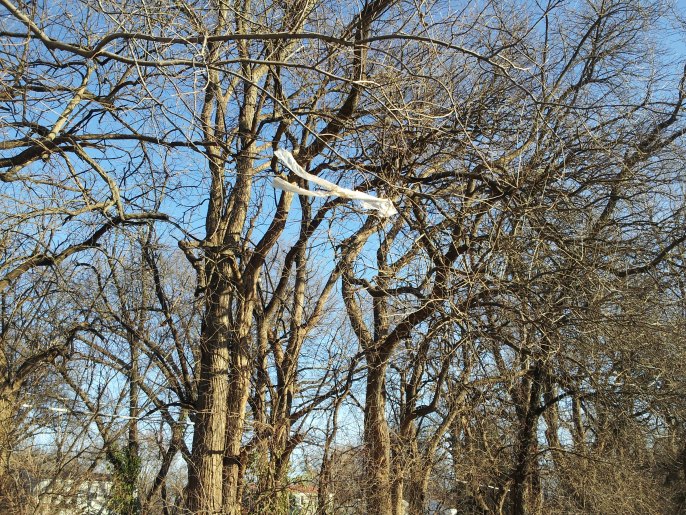No, it’s a weathered, shredded plastic grocery bag.

Inevitably, when I’m out for a walk, I see plastic bags blowing in the wind or snagged by a branch and flapping in the air. Often, I pick the bags up and carry them with me till I get to a store with a recycling barrel. Plastic bags weigh next to nothing., so carrying them for a little while isn’t a big deal.
I realize, of course, that picking up and recycling a bag or two makes approximately zero difference in the grand scheme of things. At the same time, I’m pretty certain that an individual turtle or sea bird or some other marine creature will be spared harm because I took a second to pick up a plastic bag.
What’s happening in the world’s oceans is appalling. If you haven’t read this before, you might think that I’m making it up, but, in fact, there are continent-sized patches of floating garbage in the Atlantic, Pacific, and Indian oceans.* And most of that garbage is plastic. Consequently, more than half of the Earth’s sea turtles and almost all of its sea birds have ingested plastic.
So if you’re out for a walk and you see a plastic bag blowing by, you can prevent it from landing in a creek or a storm drain and being carried by the current to a river and then to the ocean and then to the stomach of a century-old tortoise by picking the bag up and recycling it. If recycling is too inconvenient, throwing the bag away in a trash can will at least keep it from ending up in the stomach of some marine creature.
* http://education.nationalgeographic.org/encyclopedia/great-pacific-garbage-patch/ http://news.nationalgeographic.com/news/2010/03/100302-new-ocean-trash-garbage-patch/ http://news.nationalgeographic.com/news/2014/04/140404-garbage-patch-indian-ocean-debris-malaysian-plane/
If your nerves can stand it, check out one or both of the stories linked below.
By 2050, Our Oceans Will Hold More Plastic Than Fish
http://www.usatoday.com/story/news/2016/01/24/oceans-more-plastic-than-fish/79267192/